Whether you make your own jerky or prefer to buy from your local, you will want your jerky to retain its flavor and consistency. Jerky (dehydrated meat) that has been made and stored should last well for long periods of time.
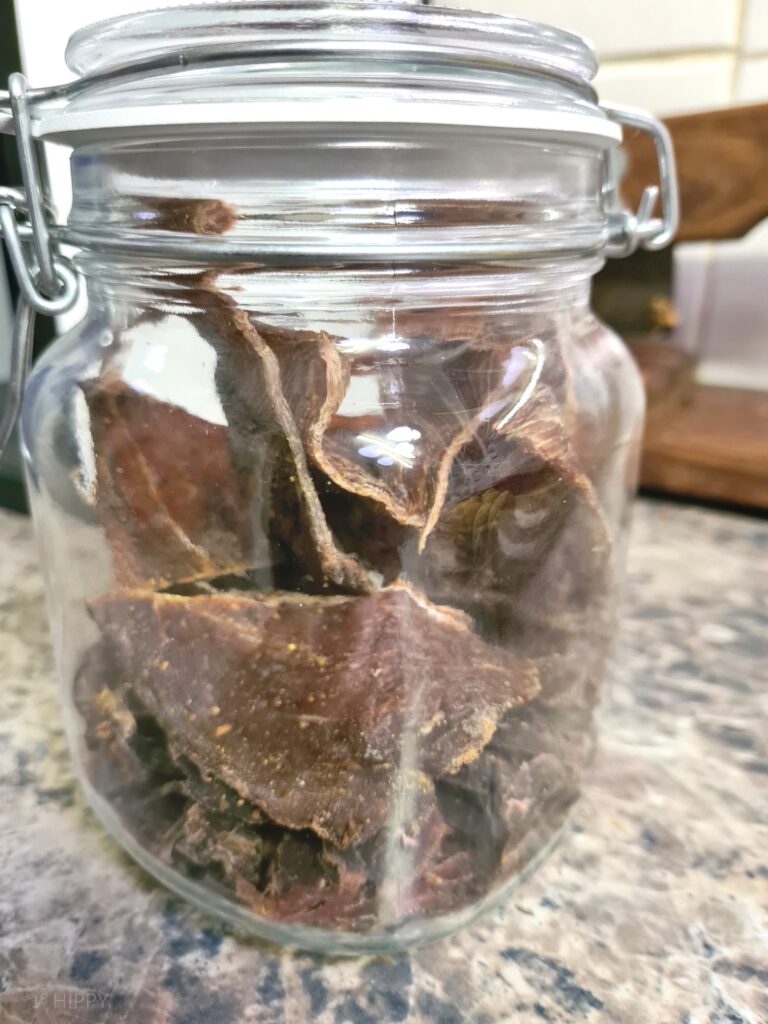
But the most important question is: just how long can beef jerky last?
Jerky should last for up to 2 years if it has been properly cured (commonly done as part of marination), dehydrated (removal of the liquid from the meat), and stored (in an air- and moisture-tight container away from heat).
If you make your own jerky, it is recommended that you eat it within 2 months. If it is made properly and vacuum sealed, it can last as long as store-bought jerky. Commercially produced and packaged jerky can last 1 – 2 years.
How Do You Know if Your Jerky Is Spoiled?
The color, texture, and smell are all clues to tell you if it is still safe to consume your jerky. Of course, you will have to know how jerky should look, feel, and smell, to give yourself a reference point.
The darker the meat becomes the older it is. The recipe for the marinade can affect the color of the meat to a degree, as can the thickness of the meat.
Sweet jerky marinade does not result in very dark jerky. Thick cuts of meat are always darker than thin sheets because it takes longer to cook – and dehydrate.
The jerky should be flexible – it should be bendable. As it ages, it will become brittle and snap if it is too old.
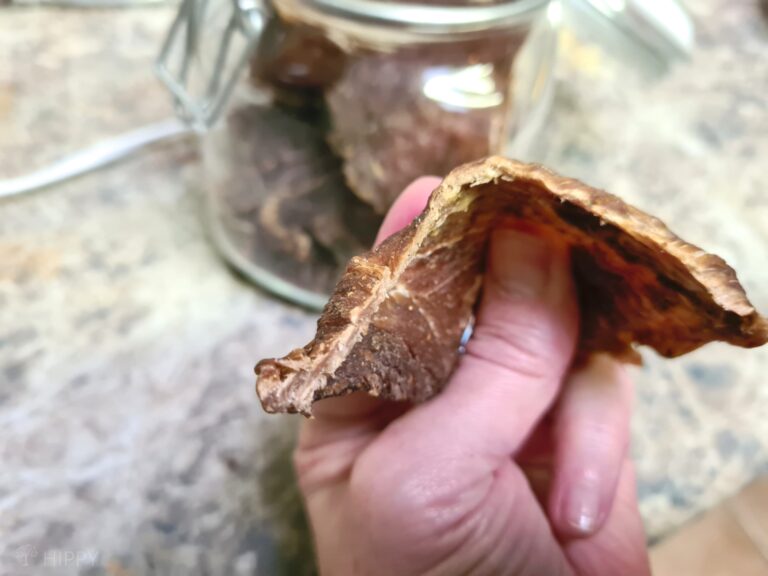
The jerky could develop a sour smell, which is the most obvious clue that it’s no longer safe to eat. Rotten meat gives off a bad odor long before anything starts growing mold.
There is no test like the smell test to find signs of spoilage…
Always check the expiration or best-by date on the package, and ensure it is properly sealed before you buy.
What Happens if You Eat Bad Jerky?
So, what if your beef jerky does go bad and you eat it anyways? Well, first off, why would you eat bad meat? Second, you get sick.
Food poisoning is an easy result to get from eating bad jerky. It’s also a very, very unpleasant experience. The symptoms will often include fever and nausea – and that’s just for starters!
Storing Your Jerky to Keep It Fresh for Longer
Lean jerky always lasts significantly longer than fatty jerky – especially pieces with visible fat attached.
Fat breaks down at a different rate than meat, and it does not absorb curing agents well. The fat will rot, and it will cause the meat to break down and rot with it.
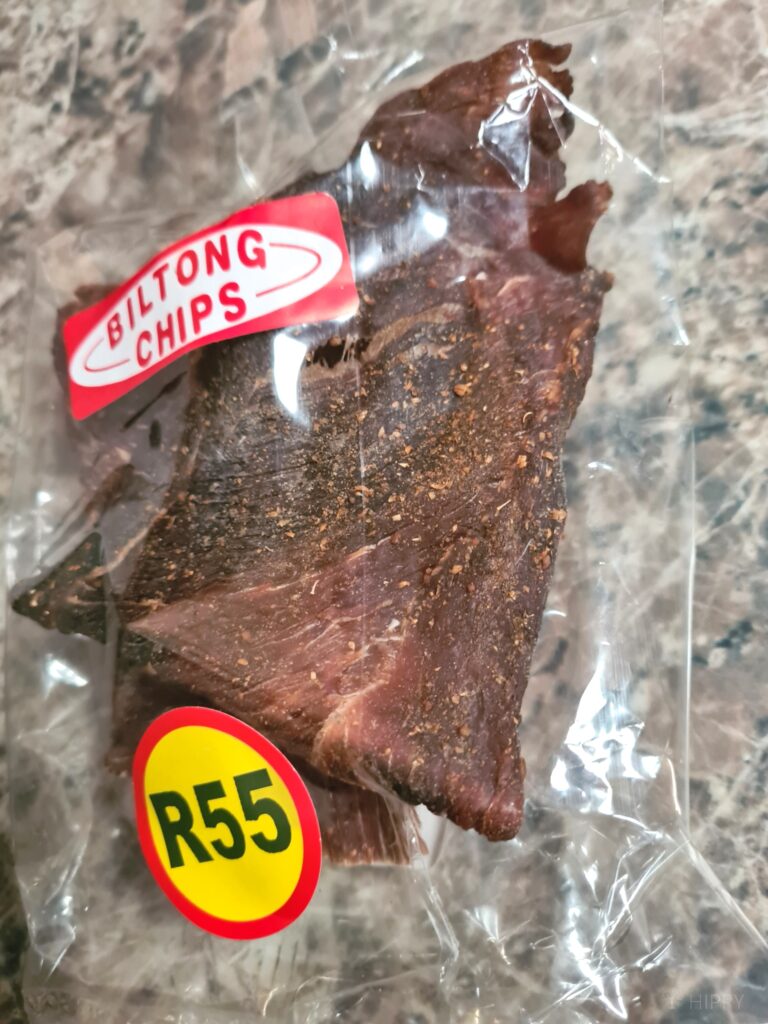
Always look for lean jerky if you want to store it. If you like fatty jerky, it must be stored in the fridge and consumed within 1 – 2 weeks.
The absolute best way to store jerky is by vacuum packing it and keeping it in a fridge. If you have made a lot of jerky, you can separate it into smaller portions, vacuum sealing each pack and freezing what you don’t need.
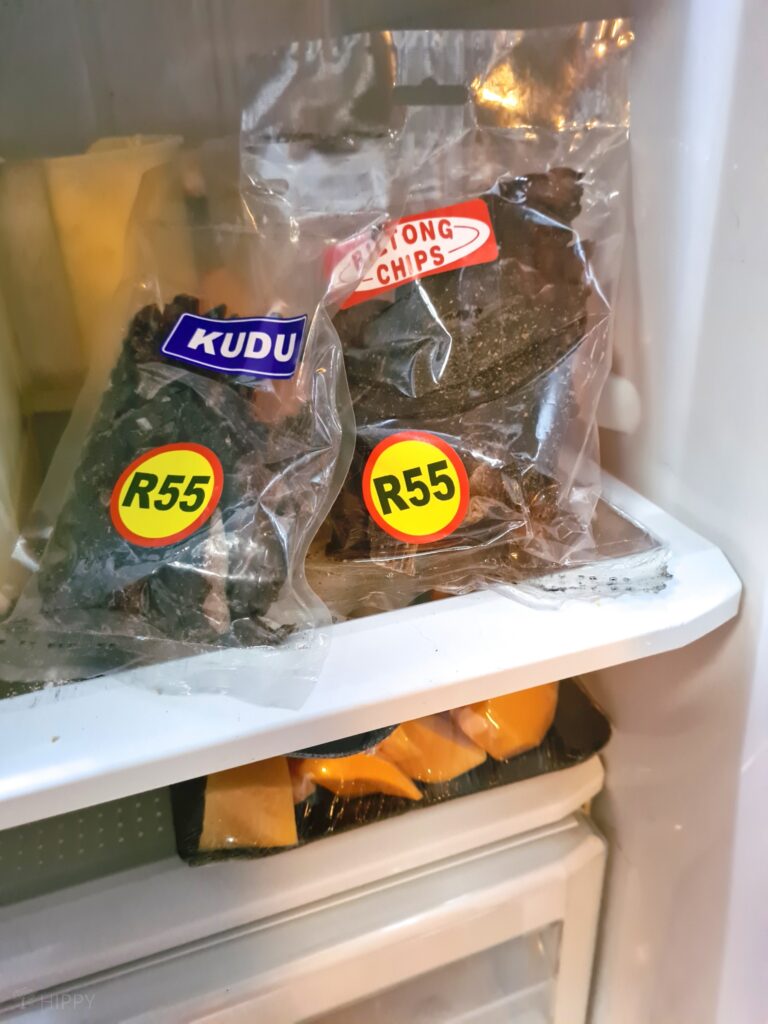
Freezing vacuum-sealed packages is how butchers store the jerky they sell in their stores or send to larger stores and supermarkets.
If you purchase jerky, it is most often sold in brown paper bags or, in some cases, a vacuum-sealed packet. Try to keep the pack sealed until you want to consume it.
If you make your own jerky, you may want to invest in a food vacuum sealer and reusable vacuum bags. As you remove jerky, reseal it immediately. Once the seal is broken, store it in an airtight container in the fridge.
That is the very best way to keep your jerky fresh and tasty; it is not the only way to store it if you want it to last a long period.
The elements you should be most concerned about when storing jerky are air and moisture.
If the meat has been properly cured with salt and properly dehydrated, moisture from within should not be a problem.
Moisture from the outside could be an issue. While storing jerky in the fridge is recommended, it should always be stored in a moisture-tight container or packaging.
If you do not vacuum seal your jerky, you may want to consider adding an O2 (oxygen) absorber to help keep the jerky dry.
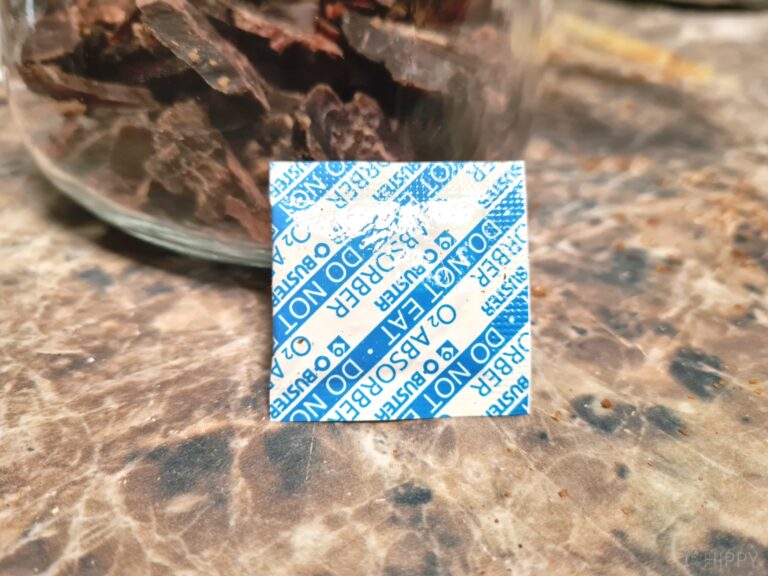
If you freeze jerky, it should always be vacuum-packed to prevent freezer burn.
Obviously, making jerky involves exposing it to heated air. If it were not for the salt in the curing process, the meat would just cook and then rot in the air.
Once your jerky is ready, or if you are storing store-bought jerky, store it in an airtight container to preserve the taste and to prevent it from drying out too much.
It is completely safe to store jerky in a cool, dark pantry if it is safe from air and moisture. Again, the safest way is in a vacuum-sealed bag. It must be protected from air and moisture, and it is important that the meat is properly cured and dehydrated.
Storing it in the fridge is great, it keeps it fresher for longer, but our ancestors did not have fridges or deep freezers.
They relied on the salt to cure it, and proper dehydration to preserve their meat and laid the groundwork for our yummy favorite treat.
If you keep it in a pantry, make sure there are no leaks in the ceiling above it, and that the package is not open exposing the meat to any moisture in the pantry. Make sure the jerky is not sitting in moisture, or below any liquid that could drip onto it.
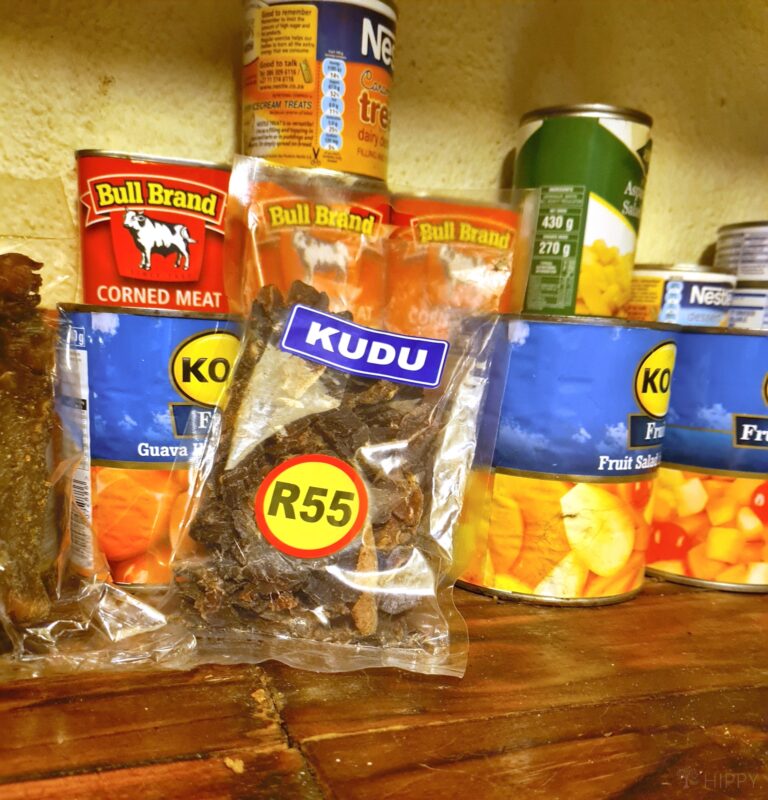
If you want your jerky on your kitchen counter, there are a few things you will need to attend to.
If you want your jerky on your kitchen counter, there are a few things you will need to attend to. First and foremost, make sure you do not live with any teenage boys! Teenage boys will have an extremely adverse effect on the long-term storage of your jerky.
Jokes aside, it needs to be in an airtight container and stored away from any appliances that generate heat, like the stove, kettle, microwave, toaster, etc.
Heat can cause precipitation (moisture), and moisture will invite bacteria to the party every time you open the container and remove a piece.
Even if you are quick, airborne bacteria, as well as bacteria that cling to our hands, can contaminate the jerky if there is moisture to encourage its growth.
If You Are Storing Your Jerky on the Counter, Make Sure It Is in An Airtight Container Away from the Stove or Other Kitchen Tools That Generate Heat
If you make your own jerky, and you do not vacuum store it in a fridge or deep freeze, you should consume it within 2 – 3 months.
I store mine in the deep freeze in resealable vacuum packaging and move it to the fridge to thaw and to keep it fresh until it is wanted – or needed. I have a hiding space under a layer of vegetables in the deep freeze that has always been teen-boy-safe.
Saving Jerky That Is Too Dry
If your jerky gets too dry, it can be salvaged by adding/replacing the moisture lost through dehydration and time (a.k.a rehydration).
You can do this by adding moisture in the microwave, soaking it in hot water or soup, sealing it in a packet with a vegetable and placing it in the fridge, or placing it in a mixture of the same sauces used to marinade it.
Conclusion
When you purchase jerky, feel it through the package to see if it is flexible; check the expiration date; check the package to ensure that there are no tears in the package; and always look for droplets of moisture.
Jerky that has been made and packaged should not have moisture and it, therefore, it should not sweat (form condensation) in the packaging.
Remember the enemies of jerky:
- Air
- Moisture
- Heat
- Fat
- Teenagers
May the force be with you in your quest to store your jerky, where teenagers will not give you a chance to figure out whether your storage solution works for 1 – 2 years.

Di-Anne Devenish Seebregts was raised in an environment where daily life consisted of hiking, environmental conservation, growing fruit and vegetables, and raising poultry for meat and eggs.
She combined her passion for the writing word with her love of the pride that comes with not relying on others. She raised three children (who are now adults) to value the environment, and understand the value of being self-sufficient.
Find out more about Di-Anne on our About Us page.

Jerky doesn’t last long here. The kids LOVE it. But I figure it will be a good way to save any beef, pork or chicken in the freezer if the power goes out…
Are you sure that you are raising your kids and not mine?
I recently found a bag of jerky that I bought from WallyWorld in the spare tire well in the trunk of my car. It was about 5 years old. I opened it, expecting a rancid smell but got none. The jerky was hard as wood. There was no mold or anything funky so being “brave”, I took a bite. It was edible somewhat. Soaking it for a few hours would have been a good idea. I struggled through it. Would I want to do that again? No.
🤣 You live and learn 🤣
I found some deer jerky from the butcher shop.
It has been vacuum sealed and in the fridge for about 4 years.
Is it still good??